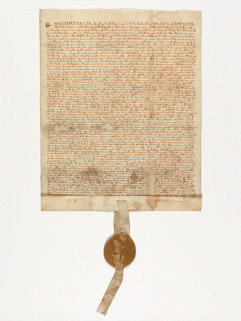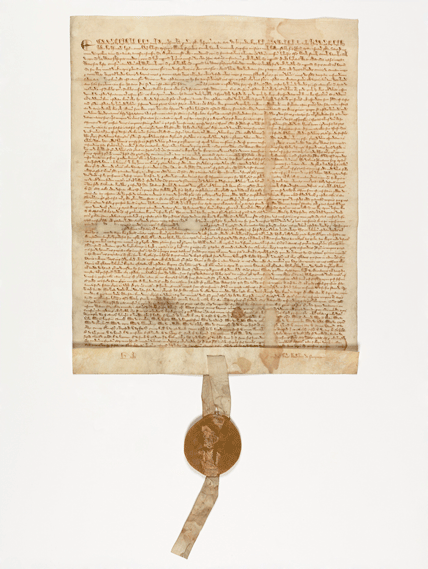
Copy of Magna Carta from 1297, at the National Archives, Washington, DC
The foundation of modern democracy is often dated to June 15, 1215, when King John of England signed Magna Carta (the Great Charter) on the plain at Runnymede, by the River Thames. Agreeing to the demands of an assembly of England’s barons, the king submitted himself to the rule of law. The document put in writing for the first time many aspects of the customary law under which Englishmen had lived for some time. These included the right to a trial by a jury of one’s peers; the right to some sort of legal process before life, liberty, or property could be taken; the right not to be taxed without some measure of representation; a ban on cruel and unusual punishments; and the idea that justice should neither be sold nor unnecessarily delayed.
For eight centuries, Magna Carta has undergirded the constitutional framework of England (now the United Kingdom) as well as that of English-speaking countries that were at one time colonies of Great Britain, such as the United States, Canada, Australia, and New Zealand. Three of Magna Carta’s original clauses remain a part of British law; others, such as those outlawing fishing weirs (river barriers) and mandating the proper width for bolts of cloth used to sew monk’s robes, were repealed by Parliament in the 1800s when the statutes of the realm underwent an updating. Although its legacy and present relevance is debated, there is no doubt that historically it has played a major role in the development of constitutional democracy. Magna Carta was cited in arguments before the U.S. Supreme Court as recently as 2003.
The famous English jurist Lord Denning once summed up the lasting importance of Magna Carta, calling it “the greatest constitutional document of all times—the foundation of the freedom of the individual against the arbitrary authority of the despot.” Perhaps no document in the history of the world other than the American Declaration of Independence—whose signers saw Magna Carta as a historical precedent for asserting rightful liberties against a king’s tyranny—has had so broad an impact on government and politics.
Image credit: © The US National Archives and Records Administration
Related Links
- Magna Carta and Its American Legacy
Read about the impact of Magna Carta on democracy in America. (Source: National Archives and Records Administration; accessed June 15, 2015) - 6 Things You May Not Know about the Magna Carta
Check out these lesser-known facts about Magna Carta; links to article on the broader background and context. (Source: HISTORY.com, June 15, 2014) - Magna Carta: Standing the Test of Time
This essay explains the legacy and relevance of Magna Carta. (Source: Spiked!; accessed June 15, 2015) - History of the Magna Carta: 800 Years of Liberty
The “official” website for the commemoration of the 800th anniversary of the signing of Magna Carta.
(Source: Magna Carta 800th; accessed June 15, 2015) - The Magna Carta Project
To mark the 800th, the Magna Carta Project aims to provide resources and commentary on Magna Carta for scholars, schools, and the public; download a curriculum package produced for schools in England. (Source: Magna Carta 800th; accessed June 15, 2015) - The Magna Carta
View a copy of Magna Carta here.
(Source: National Archives and Records Administration; accessed June 15, 2015)




